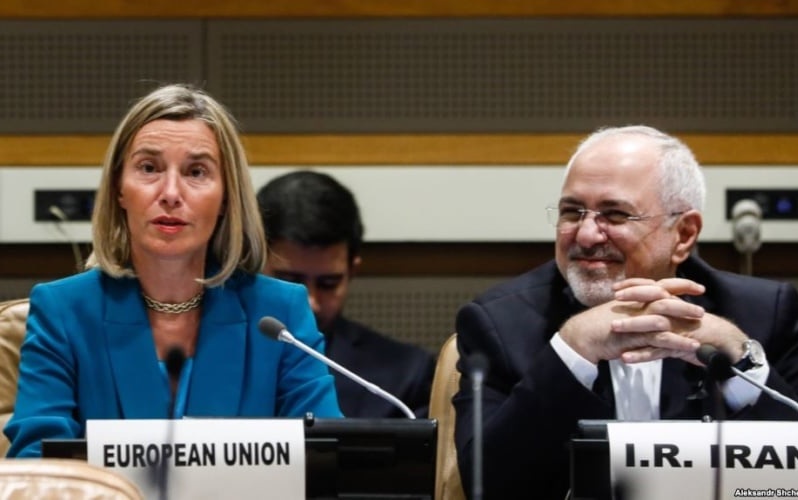Iran Foreign Minister Mohammad Javad Zarif with the European Union’s Federica Mogherini on sidelines of UN General Assembly, September 2018 (Aleksandr Shcherbak/TASS)
Amid US withdrawal and Iran’s suspension of some of its commitments, European powers have called for an urgent meeting on the 2015 nuclear deal.
The European Union’s foreign policy chief Federica Mogherini and the Foreign Ministers of the UK, France, and Germany said, “compliance issues must be addressed within the framework of the JCPOA [Joint Comprehensive Plan of Action], and a Joint Commission should be convened urgently.”
The diplomats said Iran was “pursuing activities inconsistent with its commitments”, following Tehran’s declaration that it is suspending limits on stocks of 3.67% uranium, pursuing enrichment up to 5%, and possibly returning to its pre-2015 level of 20% fuel.
After more than a decade of dispute and negotiations, Iran reached the agreement in July 2015 with the 5+1 Powers (US, UK, France, Germany, Russia, and China). But the Trump Administration withdrew from the JCPOA in May 2018 and imposed comprehensive sanctions in November, tightening them this spring.
Demanding that Europe confirm economic links to bolster Iran’s troubled economy, the Iranian regime set a deadline of July 7 before it breached the restrictions on uranium production and on construction of the Arak heavy-water reactor, which could generate plutonium by-product that can be used in military programs.
See also Iran Daily, July 7: Tehran Breaks Nuclear Deal’s Limit of 3.67% Uranium
The European powers have not triggered a dispute resolution process and are not pursuing sanctions to punish Iran. But Mogherini and the Foreign Ministers said, “Iran has stated that it wants to remain within the JCPOA. It must act accordingly by reversing these activities and returning to full JCPOA compliance without delay.”
In a conciliatory move, Iran’s Foreign Ministry said on Wednesday that it welcomes mediation by France, after President Emmanuel Macron spoke with both Iranian counterpart Hassan Rouhani and with Donald Trump.
Spokesman Abbas Mousavi “welcomed France’s role in reducing tension and implementing the accord”: “The French are part of efforts… to keep the nuclear deal alive.”
Emmanuel Bonne, Macron’s top diplomatic advisor, is in Tehran for further talks.
Last month Iran rejected mediation efforts by both German Foreign Minister Heiko Maas and Japanese Prime Minister Shinzo Abe, who was carrying a message from Trump.
See also Iran Daily, June 13: Tehran Rejects Japan’s Mediation; 2 More Tankers Attacked
Iran Daily, June 11: Tehran Rebuffs Germany’s Mediation, Criticizes Europe as Well as US
However, the risk of confrontation then escalated with attacks on two tankers in the Gulf of Aden and Iran’s downing of a US drone. Donald Trump approved but then quickly vetoed American airstrikes on Iranian radar and anti-aircraft positions.
The European Union launched a Special Purpose Vehicle, known as INSTEX, in February for limited non-dollar trade in Iranian oil and other commodities and goods. Tehran rejected the mechanism because of “humiliating conditions” such as the EU’s concern over Iran’s missile program, activities in the Middle East, and alleged involvement in assassination and bomb plots in Europe.

